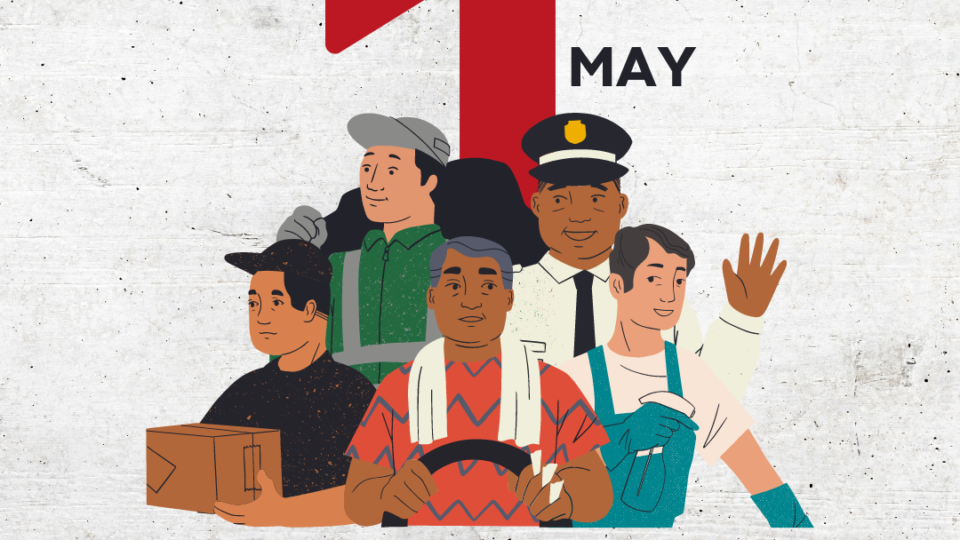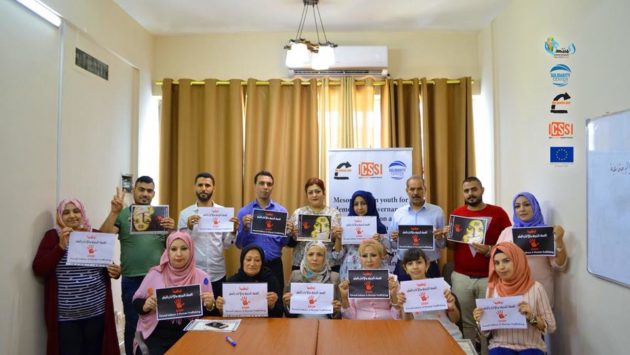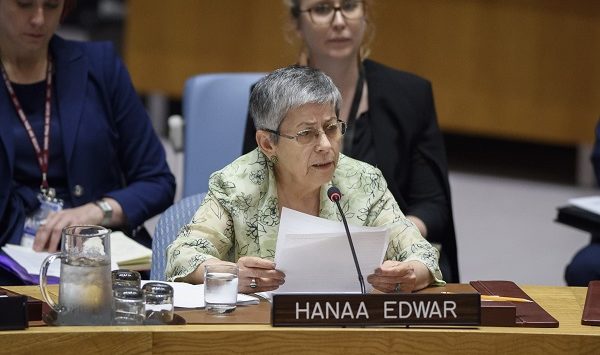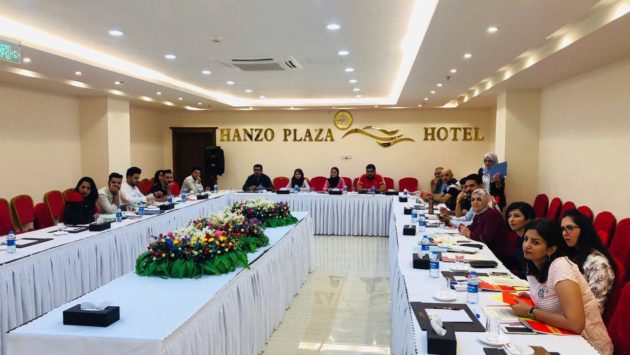The Reality of workers and employees in Iraq
Third Annual Report by the Iraqi Observatory for Workers and Employees rights
Dedicated to the workers Day 1st of May 2023
The Iraqi Observatory for Workers’ and Employees’ Rights continues to issue its periodic reports. This third annual report coincides with May 1st, International Workers’ Day, and the third anniversary of the observatory’s establishment. Over the past three years, the observatory has issued eleven quarterly reports and three annual reports, including this one.
The third annual report includes a study prepared by the observatory’s management and its network of observers across Iraqi provinces. The study examines the reasons for the young people’s reluctance to join trade unions, in addition to other violations observed between May 1st, 2022, and April 30th, 2023.
- The labor unions in Iraq are viewed with apprehension and caution by the youth.
The youth are the main pillar of labor unions around the world, and these unions work to develop programs to attract young people of both genders to join labor unions, build their professional and union skills, and prepare them for union leadership positions at various levels. They also work to overcome all the difficulties that hinder their access to labor union work.
In Iraq, the Iraqi labor movement has gone through difficult conditions since the late 20th century and has lost a significant percentage of its membership due to the decision to convert workers to employees in government departments and the public sector and to deprive them of the right to organize under Decree 150 of 1987. Despite political changes in Iraq after 2003, the labor movement has not been able to address the negative effects of the past. On the contrary, challenges and obstacles have increased for labor organizations for several reasons, including the deteriorating security situation in Iraq, especially during the period of 2005-2008, sharp divisions in the labor movement, and the lack of legal frameworks to protect labor unions and members, and other factors that contributed to the decline of union membership and the failure to integrate young people and women into labor union work in a manner that corresponds to their actual representation in the labor market.
The observatory sheds light in this report on the reasons that hinder young people’s entry into the labor union world, based on the data provided in this section on the results of the electronic survey designed and analyzed for a sample of 684 young people of both genders from all Iraqi provinces, consisting of 74.2% males and 25.8%.
According to the study’s results, young people point out the main reasons that led them not to belong to labor unions, including personal matters for workers and employees, their perception of unions as non-independent organizations, the concept of labor unions among young people, the services they provide to members, and the legal frameworks of labor unions. Other reasons are related to some social traditions and male domination in the r labor unions, which some of the female study participants experience.
The forefront of reasons that prevented young people from joining labor unions is the lack of conviction, 35.3% of the young people in the study sample, in the current relevance and usefulness of the services provided by these organizations to workers and employees who are members of them. While the legal framework and the lack of necessary legal protections for practicing trade unionism are hindering 33.2% of young people from joining existing unions or establishing new ones.
A group of young people in the study believe that some of the labor unions in Iraq are not independent enough to belong to, where 27% of young people see those unions as subject to the control of some political parties and movements, while 15% believe that the unions are subject to the control of some government agencies. At the same time, 11.7% of young people in the study believe that unions are subject to the control of employers, and some employers occupy union positions in some trade unions. The issue does not end with young people’s belief in the control of some government agencies, employers, political parties, and movements. As 24.8% of them confirm the control of some individuals over union joints, especially the leadership positions, they do not give young people the opportunity to hold advanced positions in the union. This pushes young people to not belong or leave union work. In addition, 6.8% of the young people surveyed, especially females, believe that the unions are subject to male domination and that there is no room for women to engage in union work or hold leadership positions with percentages within trade unions that correspond to the proportion of women in all sectors of work. Traditions and social customs also hinder 5.12% of women to access union work, while the factor of time stands against the desires of 22.4% of young people to enter union work in the absence of sufficient time for them to engage in union work.
The weakness of educational and awareness programs is reflected in the levels of union membership, as evidenced by the lack of knowledge of 21.4% of young people about the work and objectives of labor unions and what they can offer in terms of services to workers and employees. At the same time 22.7% of the young people indicate their lack of knowledge about the systems and regulations governing the work of trade unions. while 6.7% have no personal desire to belong to existing trade unions.
3.37% of the young workers in the study sample believe that there are other reasons that have led them not to join existing labor unions in Iraq at present. These reasons include the youth’s lack of conviction in the benefit that unions can provide them, as they do not offer any services to their members or provide legal protections for them, and their weak impact in influencing government policies and decisions. The study sample lacks trust in those who work in the union because most of those who apply for union work do so for their personal interests, and corruption has become rampant in some unions, according to the young people’s description in the study. Others justify their non-membership due to the absence of workers’ unions in their workplaces, and some have only recently heard of them for the first time, assuming that such organizations do not exist in Iraq.
However, 55% of workers express their desire to belong to trade unions if the opportunity arises, provided that there are independent and democratic unions capable of effectively representing their members. Meanwhile, 30% are hesitant to join the union movement, while 15% reject the idea of belonging to trade unions at present.
For more information, the attached video in the link below can be viewed.
- The International Labour Organization’s Standards Application Committee has placed Iraq on the shortlist.
On June 10th, the International Labor Organization’s Standards Application Committee approved the necessity of Iraq’s commitment to implementing international standards regarding Conventions 87 and 98, which concern the right to freedom of association and collective bargaining. The Iraqi labor unions and federations conference emphasized in a statement that the decision of the International Standards Application Committee confirms the demands of the Iraqi labor movement to work on abolishing the oppressive Trade Union Law No. 52 of 1987 and enacting a new modern and fair law that includes all sectors of production (public, private, cooperative, and mixed), as well as emphasizing the right to collective bargaining to defend the rights and interests of Iraqi workers.
- Delay in the payment of salaries and financial dues.
The observatory recorded more than 23 protests and demonstrations throughout the past year due to the delayed payment of salaries and financial dues for employees and contractors in government departments across Iraq, including the Kurdistan region. A janitor attempted suicide at a hospital in Kalar, Sulaymaniyah province due to not receiving his salary for three months.
- Protests demanding job opportunities and permanent employment.
127 protests and demonstrations were recorded demanding job opportunities and permanent employment, most of which were by highly educated individuals, including aviation and oil engineers.
- Retired Basra education employees without salary.
Despite more than a year and a half passing, and until the year 2022, retirees in the education departments of Basra, the Kut textile factory, and the General Company for Petrochemical Industries have not received their retirement salaries due to their departments not paying their retirement deductions that were deducted from their own salaries. Additionally, their retirement bonuses have not been paid, without any consideration for their long service in their respective departments. The number of retirees affected by this issue has exceeded 1600.
- Failure to consider/recognize academic degrees
The Iraqi Observatory has recorded 19 protests carried out by employees of government departments to recognize their academic degrees obtained during their service.
- Workplace Injuries
A total of (108) workplace injuries and (50) deaths have been recorded in both the public and private sectors, according to reports from the National Center for Health and Occupational Safety and Hospital Emergencies, as well as observers throughout Iraq.
The Iraqi Observatory for Workers and Employees’ Rights
Brief introduction
Since its establishment earlier this year by a group of union activists and civil society defenders who believe in union freedoms and social justice, the Iraqi Observatory for Workers’ and Employees’ Rights has been monitoring and documenting the injustices and violations suffered by workers and employees from the state and employers, as well as the political and union situation due to the absence of fair laws that protect workers and their unions. The Observatory aims to monitor and assess workers’ and employees’ rights and union freedoms, prepare reports and studies, and submit them to the relevant authorities, accompanied by basic proposals and recommendations, to promote workers’ rights and union freedoms in the Republic of Iraq. In addition, it provides moral and psychological support to them through consultations and studies in order to provide a suitable environment and work on promoting the concepts of democracy and building peace to ensure the rights of this marginalized group.
The Observatory Management
To contact the observatory:
E-mail:- almrsdalraqy@gmail.com
Whatsapp:-
+9647801366740
+9647719892465




